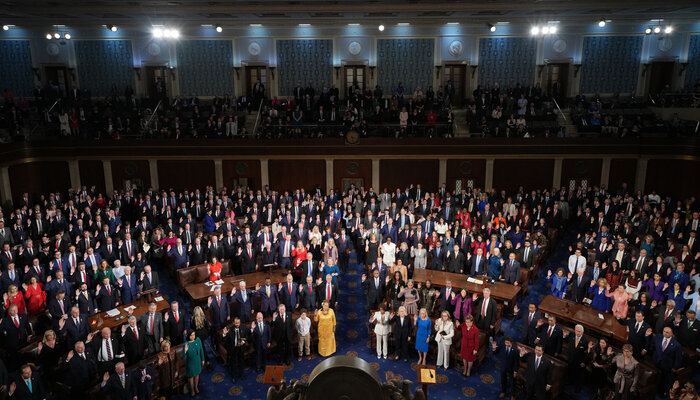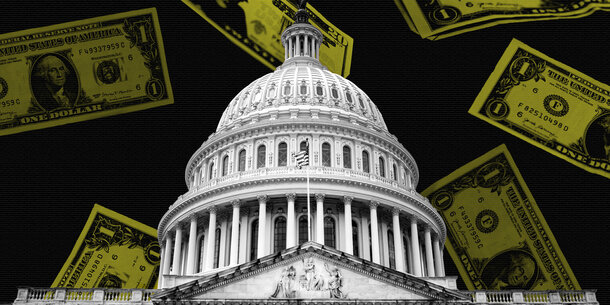Politics today feel stuck, bogged down by partisan gridlock and inefficient processes. This has produced record numbers of retirements in Congress over the past several years. This turnover could be an opportunity to unstick the system, as freshmen lawmakers can breathe new energy into Congress. But centralized party leadership, relentless fundraising demands, and political violence all constrain the ability of new members to legislate and represent their constituents. To fix the system, changes must be made.
Political scientist Roger Davidson wrote that institutional reform requires a particular type of changemaker, and congressional freshmen are often these new voices. “In every era, at least a few members of Congress cultivate a lively interest in the institution itself. . . . Such members might be called procedural entrepreneurs, in contrast to the more numerous policy entrepreneurs. Many, perhaps most of them seek innovation out of political self-interest,” Davidson writes, adding that “procedural innovators are more likely to be among the ranks of the ‘have nots’— especially junior or minority-party members — than among the ‘haves.’” New lawmakers do not have a stake in the sticky status quo, and in many cases they stand to gain more political power by unsticking it.
History confirms this theory. The three largest classes of freshmen over the past 50 years were responsible for landmark institutional reforms. In the wake of the Watergate scandal and in the midst of the Vietnam War, the 92 freshmen members of the class of 1974 ushered in sweeping changes that empowered rank and file members, including dismantling the seniority system guiding committee leadership and reforming the committee assignment process. The 73 new members class of 1994 campaigned on the “Contract for America,” which laid out a vision for congressional reform and Republican policy priorities. Speaker of the House Newt Gingrich (R-GA) instituted dramatic changes to the committee process and gutted congressional staff. Following the election of Donald Trump in 2016, a wave of 89 freshmen who were “younger, bluer, and more diverse than ever” swept into Congress in 2018. That class catalyzed the creation of the Select Committee on the Modernization of Congress, tasked with reforming congressional procedures, and it was instrumental in revitalizing policy priorities and processes, including pushing forward key voting rights and campaign finance reforms.
In addition to shaking up the institutional process, freshmen bring new perspectives. Class of 2018 member Lauren Underwood (D-IL), for example, partnered with senior member Alma Adams (D-NC) to start the Black Maternal Health Caucus after Underwood lost a friend in childbirth. “We did this because women are dying every day, and I am the first and only young Black woman who has ever been here,” Underwood said at the announcement of the creation of the caucus. “I think that American people assume that Congress works on the issues that are most important for our country. No, Congress works on the issues that its members raise. And if you do not have a Congress that reflects the lived experiences of the American people, their issues don’t get raised.” Underwood said.
Despite the benefits that new members bring to the institution, Congress provides them little institutional onboarding. Many members I spoke to say they could not even find rooms they were looking for, and many lament the lack of policy, process, and administrative support.
“Orientation was pretty content-free,” said Rep. Chrissy Houlahan (D-PA), a member of the class of 2018. “They told us, ‘Here is your health insurance, here is how you get paid.’ . . . I could have used more information about how you actually are a congressperson. How do you vote? How do you do a committee?”
Shifts in congressional process, rising violence and distortions of money in politics render making change even harder for today’s freshmen than for their predecessors. As a result of the changes instituted by Gingrich, congressional leadership has gained greater authority, leaving even less power for individual members, especially freshmen.
Today, bills are frequently assigned by the leadership into committees but then forced quickly back to the full chamber for a vote without much time for committee deliberation. In 2018, for example, members were given just 18 hours to review a more than 2,200-page bill before voting on it. Money floods campaigns and further overwhelms congressional schedules. The Supreme Court’s 2010 in Citizens United v. Federal Election Commission paved the way for unlimited individual and corporate giving. As a result, members spend hours on the phone dialing for dollars and a significant portion of their time in other fundraising activities. They face increasing pressure to pay dues to the party in order to build power and clout in the chamber. According to a Congressional Management Foundation study, members today spend only one-third of their time legislating.
Further, the risk of violence faced by today’s lawmakers, as well as harassment both in person and online, acts as a major deterrent to members working on controversial issues and engaging with citizens. While political violence in America is not new, technological shifts, changes in gun laws, and a rise in violent attacks place exceptional pressure on new politicians in a post–January 6 world. “I’ve never been more terrified,” said Rep. Veronica Escobar (D-TX) in a recent media interview.
Our democracy is stuck and incoming reformers have less and less space to unstick it. Congress can better support all of its members — especially the new ones — by creating robust new member onboarding, reforming campaign finance, and instituting key safety policies. Members of Congress also need more staff and larger budgets to be able to do their jobs. These changes are essential for Congress to evolve and adapt as an institution.
Maya Kornberg is the author of the forthcoming book Stuck: How Money, Media, and Violence Prevent Change in Congress, which chronicles 50 years of reform efforts in Congress, documents the mounting forces of money and violence that have kept these reforms from creating meaningful change, and makes the case for urgent reforms. Stuck will be published by Johns Hopkins University Press on March 10.



